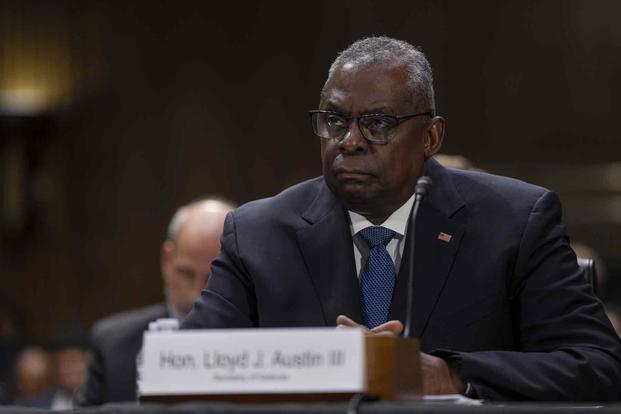
Defense Secretary Lloyd Austin has been formally called to testify before Congress about his hospitalization for complications from prostate cancer surgery that he initially kept secret.
In a letter Thursday to Austin, House Armed Services Committee Chairman Mike Rogers, R-Ala., said his panel would hold a hearing on the matter Feb. 14 and that he expects Austin to appear at the hearing after what he described as the defense secretary's "unwillingness to provide candid and complete answers" in private.
"Specifically, I am alarmed you refused to answer whether you instructed your staff to not inform the president of the United States or anyone else of your hospitalization," Rogers wrote in the letter[1]. "Unfortunately, this leads me to believe that information is being withheld from Congress. Congress must understand what happened and who made decisions to prevent the disclosure of the whereabouts of a cabinet secretary."
Read Next: Navy Redesigns Its Pregnancy Policy to Give Sailors More Choice, Career Stability[2]
Asked whether Austin would agree to testify, as well as for a response to Rogers' charge that the secretary has withheld information from him, the Pentagon did not directly answer.
"On Wednesday, the department provided the committee three letters in a good-faith effort to respond to the committee as expeditiously as possible, recognizing that there is an internal 30-day review underway, and the DoD inspector general is conducting his own review," a Pentagon spokesperson said in an emailed statement Friday.
"The department looks forward to continuing to work with the committee to accommodate its legislative needs," the statement added. "As always, we will respond to congressional requests as appropriate, to include requests for the secretary to testify."
If Austin agrees to testify, it could be the first public airing of his thought process since the Pentagon disclosed earlier this month that he had been in the hospital for days without telling even the president.
On Jan. 5, the Pentagon announced Austin had been in the hospital since Jan. 1, and the department later acknowledged that the White House hadn't been informed of Austin's hospitalization until Jan. 4. Congress didn't learn of the hospitalization until just before the public disclosure Jan. 5.
The hospitalization stemmed from complications from an earlier surgery to treat prostate cancer. While Austin was diagnosed with cancer in early December and had the initial surgery Dec. 22, President Joe Biden and the public were not told about the diagnosis until Jan. 9.
The revelation that Austin kept his health issues secret from even the White House for weeks prompted fury and bewilderment on Capitol Hill.
Rogers opened an investigation[3] into the episode last week, sending letters to Austin, his chief of staff and Deputy Defense Secretary Kathleen Hicks demanding a stack of documents and answers to a slew of questions.
In his Thursday letter, Rogers said several questions from his earlier letters remain unanswered. He also said several new questions have been raised since last week, pointing to a 911 call obtained by news outlets[4] in which an aide to Austin asked for the ambulance to be "subtle" when it arrived at the defense secretary's home Jan. 1.
"This is a time of immense global instability," Rogers wrote. "Our country deserves reliable leadership at the department. Maintaining the most ready and lethal force possible requires that everyone in the national security community be able to rely upon the secretary of defense's availability and transparency. Regrettably, you have not exhibited these attributes throughout this most recent string of events."
In addition to Rogers' investigation, the Pentagon is conducting an internal review into the breakdown in communications; the White House has instructed every Cabinet agency to review their protocols for notifying the White House about an absence; and the Pentagon's inspector general is conducting its own probe[5] into the episode.
Pressed at a Pentagon briefing this week on why Austin's aide asked the ambulance to approach quietly, Pentagon press secretary Maj. Gen. Pat Ryder declined to answer amid the ongoing investigations.
Sen. Roger Wicker, R-Miss., the ranking member of the Senate Armed Services Committee, has also demanded a public hearing with Austin, but as a member of the minority party in the upper chamber, he does not have the power to schedule one. Senate panel Chairman Jack Reed, D-R.I., has not ruled out calling Austin in for testimony but has said he wants the committee to gather more facts and for Austin to be fully recovered first.
Austin was released from the hospital Monday, but he said in a written statement that day that he is continuing to recuperate at home.
While several Republicans and at least one House Democrat have called on Austin to resign, Biden said last week that he remains confident[6] in his defense secretary, though he considers Austin's failure to inform his boss about his hospitalization a lapse in judgment.
Related: Austin's Secret Hospitalization Prompts Congressional Inquiry, Calls for Hearings[7]
© Copyright 2024 Military.com. All rights reserved. This article may not be republished, rebroadcast, rewritten or otherwise distributed without written permission. To reprint or license this article or any content from Military.com, please submit your request here[8].

 Soldiers assigned to the 3rd U.S. Infantry Regiment, known as "The Old Guard," didn't let a little snow keep them from their duty at the Tomb of the Unknown Soldier in Arlington National Cemetery, Virginia.
It was the first significant snow of the season
Soldiers assigned to the 3rd U.S. Infantry Regiment, known as "The Old Guard," didn't let a little snow keep them from their duty at the Tomb of the Unknown Soldier in Arlington National Cemetery, Virginia.
It was the first significant snow of the season